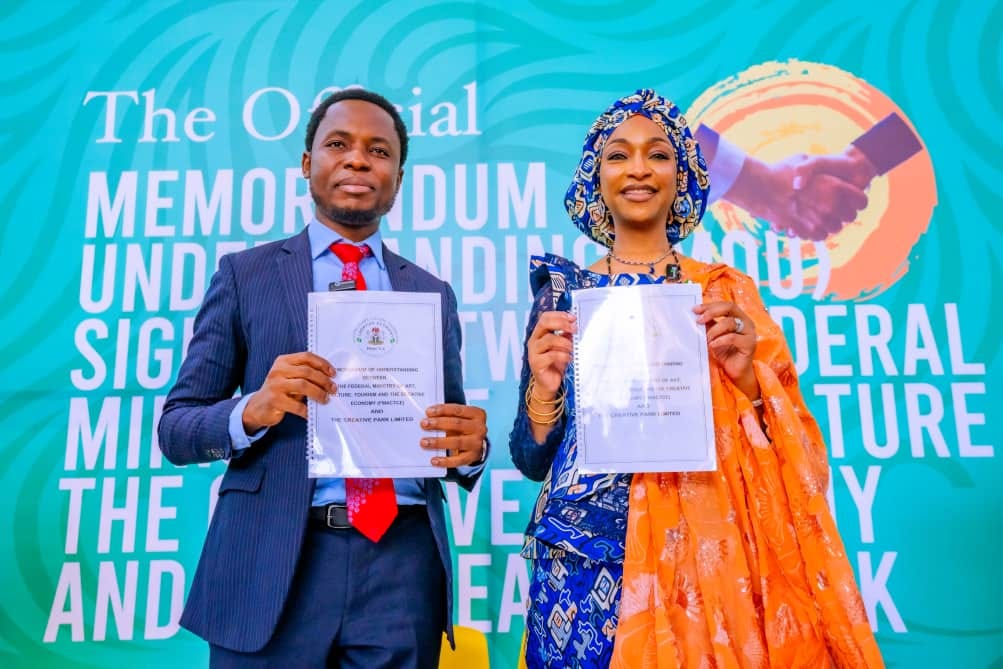The 30-Hectare Creative City Set to Redefine Nigeria’s Creative Landscape
Nigeria is on the brink of a creative revolution. The Abuja Creative City (ACC), a 30-hectare hub dedicated to arts, culture, and innovation, is set to position Nigeria as the leading creative powerhouse in Africa. Spearheaded by the Federal Ministry of Art, Culture, Tourism, and the Creative Economy (FMACTCE) in partnership with Creative Park Limited, this ambitious project aims to harness Nigeria’s vast creative potential and drive economic transformation.
At the core of the Abuja Creative City project is a vision to create an ecosystem that nurtures talent, fosters innovation, and attracts global investment. With world-class infrastructure and a commitment to sustainable development, this initiative has the potential to reshape Nigeria’s creative industry, offering unprecedented opportunities for creatives, entrepreneurs, and investors alike.
A Vision for Nigeria’s Creative Future
The signing of the Memorandum of Understanding (MoU) between Minister Hannatu Musa Musawa and Creative Park CEO Bayo Omoboriowo marks a significant milestone in Nigeria’s creative economy. At the signing event in Abuja, Minister Musawa emphasized that the Abuja Creative City is more than just a development project—it is a catalyst for change, an economic engine, and a cultural landmark.
“President Bola Tinubu has a mission to give young Nigerians something they never had—a thriving creative industry where they can excel. This city is a manifestation of that vision,” Musawa stated. She highlighted that Nigeria's creative energy is unmatched globally, and the Abuja Creative City will provide a platform to showcase the country’s vibrant arts, music, film, and cultural heritage.
Bayo Omoboriowo reinforced this perspective, stressing that Nigeria’s creative industry is no longer just about artistic expression but about economic impact. "We are building an ecosystem that will not only create jobs but also attract global investors who see the value in Nigeria’s creative sector," he said.
A Creative Hub Inspired by Global Innovation
Designed to mirror the success of international creative hubs like Dubai Media City, NEOM, and London’s Tech Hub, the Abuja Creative City will be a benchmark for sustainable development. The project will incorporate renewable energy solutions and eco-friendly infrastructure, ensuring minimal environmental impact while delivering a modern, future-ready space.
Key components of the city will include:
State-of-the-art production studios for film, television, and digital content.
World-class theatres and cinemas to showcase local and international performances.
An innovation hub for tech-driven creative startups.
Exhibition spaces and galleries for visual arts and cultural showcases.
Business-friendly policies to encourage local and foreign investment.
Beyond infrastructure, the city aims to redefine how creative industries operate in Nigeria. Entrepreneurs will benefit from tax incentives, reduced utility costs, and a streamlined process for business registration and licensing—making it easier to set up and grow creative enterprises.
Transforming Nigeria into Africa’s Cultural Capital
Nigeria’s creative economy is one of the fastest-growing sectors in Africa, contributing significantly to GDP and employment. However, challenges such as infrastructure gaps, funding limitations, and lack of structured industry support have hindered its full potential. The Abuja Creative City seeks to bridge these gaps, offering a dedicated space where creativity meets commerce.
With a focus on music, film, fashion, digital arts, and tourism, the city is expected to attract international collaborations and put Nigeria at the forefront of Africa’s creative landscape. The project also seeks to boost cultural tourism, with Minister Musawa stating that people will come to Nigeria just to experience Abuja Creative City.
Economic Impact and Job Creation
One of the most exciting aspects of the Abuja Creative City project is its potential to generate employment and stimulate the economy. The city will provide:
Opportunities for filmmakers, musicians, designers, and digital creators to showcase their work.
Job creation across various sectors, including media, hospitality, and technology.
Training programs and incubators to nurture emerging creative entrepreneurs.
A business-friendly environment that encourages startups and foreign direct investment.
Nigeria’s creative industry has already produced global superstars in music, film, and fashion, and this project will accelerate the growth of a structured, sustainable creative economy.
A Magnet for Global Investment
Attracting international investors is a key objective of the Abuja Creative City. The project’s business-friendly incentives—including tax breaks, streamlined licensing, and infrastructure support—are designed to make the city an appealing destination for global enterprises.
By offering world-class facilities and a supportive environment, Nigeria is signaling that it is open for business in the creative sector. Investors looking to enter Africa’s entertainment and media markets will find an ecosystem that fosters growth and profitability.
A Bold Step for Nigeria’s Creative Economy
The Abuja Creative City represents a bold step towards solidifying Nigeria’s status as Africa’s creative and cultural capital. With the backing of the government, private sector partnerships, and a clear vision for sustainable growth, this initiative could reshape the economic and cultural landscape of Nigeria for decades to come.
As Minister Musawa aptly put it: "This is about the future of Nigeria. This park will be the personification of our vision to position Nigeria as the cultural hub for Africa."
With the creative industry poised for unprecedented expansion, the Abuja Creative City is more than just an infrastructure project—it is a symbol of innovation, ambition, and the limitless potential of Nigerian talent.
Conclusion
Nigeria’s creative economy has long been recognized for its vibrancy, but with the Abuja Creative City, the country is taking an intentional step toward building a structured, world-class industry. This project is not just about entertainment—it is about economic growth, cultural preservation, and global recognition.






